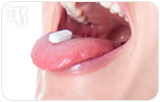
For menopausal women, sometimes it seems like there's no relief from the uncomfortable symptoms and health risks associated with declining hormone production. While treatments like hormone replacement therapy (HRT) may provide temporary relief, prolonged usage of HRT has been cautioned due to the fact that it may lead to other serious health risks, such as increased risk of breast cancer or heart disease.
Yet weaning yourself off HRT treatment may not be as simple as it sounds: a range of symptoms have been associated with HRT withdrawal. Keep reading below to learn more about these symptoms and how you can alleviate them.
HRT Withdrawal and Rebounding Menopausal Symptoms
It is important to remember that no two women's bodies respond in the same way to HRT treatment. Thus, while some women may quit HRT treatment “cold turkey” and experience little to no withdrawal symptoms, others may be majorly affected by the sudden hormone deficiency.

With the use of HRT treatments, the body becomes dependent on an external supply of hormones. Thus, when treatment is stopped, the body needs time to readjust and begin producing its own hormones naturally. As a result of this readjustment period and abrupt change in hormone levels, a woman may experience “rebound symptoms” of menopause, such as hot flashes, night sweats, and mood swings.
Most doctors recommend a period of “weaning” off of HRT treatment by lowering the dosage of estrogen over a period of several weeks to allow the body to readjust to its natural hormone levels. Women who suffered severe menopause symptoms prior to treatment may experience a similar intensity of symptoms when stopping HRT treatment. The type of HRT therapy used and the duration of treatment are also determinants in the severity of HRT withdrawal.
Getting Back to Your Old Self

Stopping HRT treatment isn't always easy: as with any pharmaceutical drug, the weaning process requires time, patience and commitment. It is important to consider lifestyle and dietary changes that support overall well-being. Exercising regularly and maintaining a well-balanced diet - rich in proteins, omega-3 fatty acids, and calcium - goes a long way in nourishing the body and encouraging the natural production of estrogen, progesterone, and androgens.
Recommendations
You should always consult your doctor before stopping the use of HRT products. He or she will be able to discuss the symptoms associated with HRT withdrawal and advise you about the best way to stop use of the treatment.


